Sometimes, it's a good idea to talk less
In a noisy world among a yearlong pandemic, political divisiveness, social media and a 24-hour news cycle, listening continues to be a lost art. But, it’s crucial to so many situations. How does a nurse listen to a patient who’s saying one thing while the symptoms “speak” otherwise? What does a therapist say to a person in crisis? How does a conductor hear individual voices in a large choir? What about a deaf student attending a college lecture? How do we make sure everyone is heard?
The only one who matters
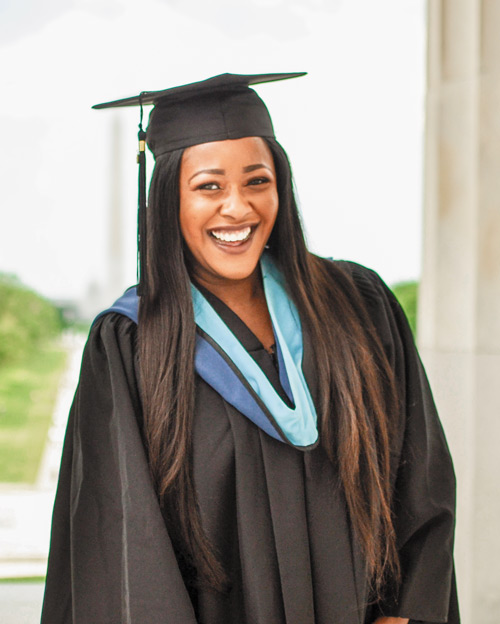
A graduate of Messiah’s master’s in counseling program, Devonish works primarily with adults who have experienced a range of trauma, attachment issues, depression, anxiety and family relationship challenges. When meeting with a client, she makes a point to put down her notebook and pen to show she’s fully focused on listening to whatever the person wants to talk about.
“Listening is the best gift a person can give someone. They’re not being judged or interrupted. They’re free to be themselves. They’re the only one who matters in the world in that hour,” she said. “They come in for one thing, but we end up working on other deep-rooted issues.”
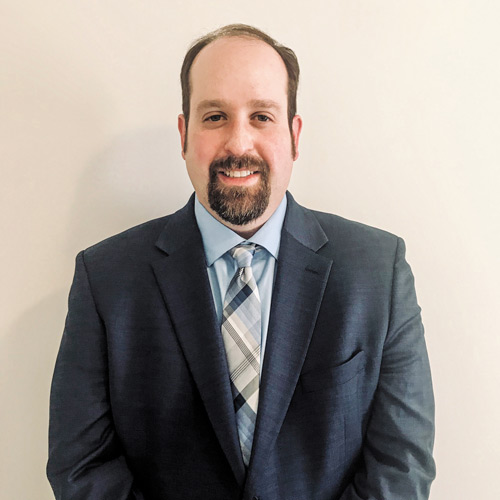
To disarm a client and to build trust, Kuniak says he makes good eye contact, smiles often, uses congruent facial expressions and, most of all, pays attention. He also asks a lot of questions, prompting clients to provide more detail after they make a statement.
“It gets them to think, and they have to articulate it more,” he said.
Although Devonish prefers to see clients face to face, she says because of COVID-19 she offers telehealth appointments. She has found the pandemic expanded her practice, with remote sessions offering tremendous accessibility.
“I love that I connect with more people who would otherwise have transportation challenges and childcare challenges and other barriers that prevent accessibility to in-person therapy sessions.” she said. “More people are showing up.”
In a busy world, it’s easy to get wrapped up in what we’re going to say next, what we’re going to do next. A counselor can help a person stop for a moment and figure out the next best steps.
“There’s a lot of noise in our lives,” said Kuniak. “Part of listening [as a counselor] is really attending to what is going on.”
A trained ear
If you have a problem, consider pouring your heart out to a musical conductor. After all, they are trained to listen to entire rooms of singers and musicians, making sure everyone performs at their best. In fact, a conductor can impart many life lessons that come in handy outside the rehearsal hall.
Listen closely.
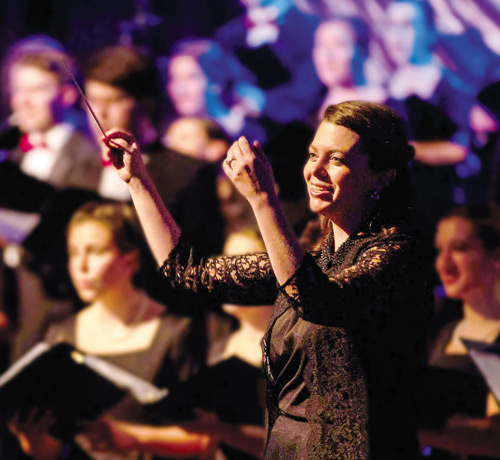
Musicians are trained to listen in a variety of ways. The Suzuki method, the philosophy of learning by ear, encourages children simply to listen to a piece of music--as if immersed in a foreign language--before any attempt to play it.
“How you learn music is interesting, because we often learn first by hearing,” said Meade. “These are great habits for your brain and memory, particularly when you’re invested and fine-tune your listening.”
Expect problems.
When Meade works with an orchestra or a group of singers, what is she listening for, exactly, in her role as conductor? Anything that sounds not quite right. And there’s always something not quite right.
“A lot of things are off very often,” said Meade. “And you start to narrow down. Filter out layers, clear out the texture, isolate options. That’s all part of the learning process for me and the ensemble. And it’s a fun and creative challenge.”
Collaborate.
According to Psychology Today, singing in a group reduces symptoms of anxiety, loneliness and depression, essentially making people happier. During the pandemic, however, singing in groups was put on hold, giving rise to many virtual choirs. Whether singing in person or virtually, working together is key. Singers learn from each other just by listening.
“It brings singers so much joy to hear others around them singing and fitting in their voices to make a whole,” she said. “Listening becomes a team sport, and they collaborate that way. They create a product that’s more beautiful and higher caliber than they could by themselves.”
Listening as a team sport sounds like something from which we could all benefit.
“If you think about how noisy the world is right now,” said Meade, “listening is a great habit.”
Question: Who’s the most important part of a healthcare team?
Answer: The patient
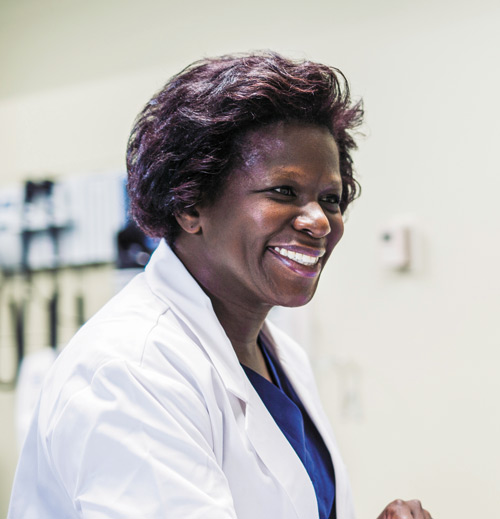
Since listening is such an important part of the nurse’s role, the types of questions a nurse asks a patient--and the way in which those questions are asked--can make all the difference. Because what a patient doesn’t say can be critical. As a human race, there are some things we won’t just say around certain people, for fear of being judged or condemned.
“If a patient senses that a nurse is not going to be respectful of their life, their lifestyle or their choices, that patient is going to clam up. They might be in a situation that is unhealthy and they want to share but they’re not sure if they’re going to be judged,” said Jones.
But God sees every patient as worth dying for. They are immensely valuable.
“At Messiah, we teach students in their very first nursing course to understand that everyone is made in the image of God. And so every person has value. We don’t have a place to judge our patients. We also don’t have a place to absolve them. That’s not our role as professional nurses,” she said.
Nurses need their patients to trust them, and that starts with building rapport. Be respectful. Ask open-ended questions--the kind that require more than a “yes” or “no”--to get the patient to elaborate.
“Then there’s what we call therapeutic communication, restating to the person. For example, ‘What I hear you saying is, you don’t want to stay longer than two days this time in the hospital.’ Or we ask them to clarify. ‘Can you tell me more about that?’” said Jones. “
Facing the patient is also key.
“Look at where your feet are pointing. Where your feet are pointing is probably where your focus is,” said Jones. “If your feet are pointing toward the door but you turn your head back to say, ‘Hey, do you need anything else?’ your thoughts are probably already out the door.”
A nurse to the nurses
As an educator, Jones says she can’t always know when her nursing students are listening or understanding a concept she’s teaching. Besides lectures, she uses case studies, quizzes and videos to help her students learn.
“I think any educator will tell you, we walk by faith and not by sight because we can misinterpret students’ messages to us,” she said. “I can recognize if a student is with me if they’re nodding, and I always look for the brows furrowed. So I say, ‘What do you all think about that?’ or ‘Somebody from this row has to ask a question, because if you have it, somebody else probably has it.’ So that way I can gauge what’s being understood.”
As the students listen to her, she also trains them to listen to their patients. But pray first.
“Something I teach my students when we pray before we go into the patients’ rooms is, ‘Lord, help us to hear. And to be open to what You’re leading us to do or say.’ It might be, ‘Pray with the patient.’ It might be, ‘Fix the blanket.’”
Suspend your agenda
“We’ve all been in those conversations where I’m letting you speak and the only thing I’m interested in is when you stop talking so that I can say my next thing,” she said. “That’s not listening to the best of my ability.”
Jones says it’s important to suspend your agenda when listening--whether it involves patients, students or anyone with whom you’re interacting interpersonally. Stay relaxed and in the moment. Listen. And then just wait.
“You can listen to the patient and incline your ear to what God is saying,” she said.
Being heard
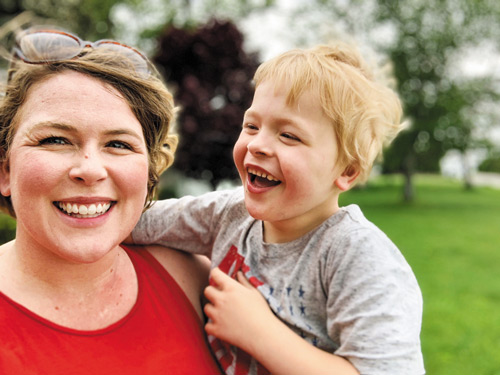
“If your child is born in a hospital, you get a screening before you even go home from the hospital,” she said. “We had no history of hearing loss in our family. This was something that launched us on a whole new journey that was completely unexpected.”
When James was 13 months old, he underwent surgery to get cochlear implants (CI). Unlike a hearing aid that amplifies sound, the CI bypasses the ear and stimulates the auditory nerve. Signals from the implant travel via the auditory nerve to the brain.
“Cochlear implants are controversial,” said Ellis, “but it’s a really incredible process. It puts the recipient at a more typical threshold of hearing. Access to sound makes a big difference in how our education pans out.”
At the college level
How does Messiah facilitate learning for a student with hearing loss? Amy Slody, director of academic success, says all students are a bit different, so there’s no one-size-fits-all option.
“The type of accommodation is dependent on the significance of the hearing loss or the specific needs of the student,” said Slody. “For example, some students simply need to read lips to understand the conversation. They are given preferential seating and the instructor wears a clear mask or face shield.”
Students with more significant hearing loss may qualify for accommodation to use captioning for video sessions or a transcription service. Zoom offers a free captioning feature, which is one benefit of remote learning during the pandemic.
“This captioning has been a blessing. It allows students, who once felt out of the discussion, the opportunity to better understand material, process it and join the conversation,” said Slody. “This would allow any student to look at a transcript and clear up confusing concepts. Sometimes, accommodations that seem to impact one only person can have a positive effect on everyone.”
Leading the way
For Ellis, she says James, who is also nonverbal, has no problem being heard among his three siblings.
“He’ll take you by the hand and lead you to what he wants,” she said. “He does a really good job expressing himself without words. His siblings do a great job of engaging with him, figuring out ‘Where is he trying to take me? What does he want?’ They’re incredibly compassionate with him.”
Ellis says, when trying to communicate with a DHOH person, it’s important to look up and enunciate. She also says COVID-19 is providing a new opportunity in perspective for the hearing community. That annoyance of trying to communicate while wearing a mask—that muffled sound—is what a DHOH person lives with.
A sign of compassion
Deaf culture, as any culture, is nuanced and complex. For example, what’s the proper way to refer to a person who is deaf? The answer is not simple. Ellis says the terms deaf and DHOH are preferable, with a caveat.
“Some people are opposed to ‘deaf’ or ‘hard of hearing,’” she said. “Some prefer Deaf with capital D as a culture, as a point of pride. As in, if you’re deaf, you own it. Just don’t say ‘hearing impaired.’”
Also, learn their language. While most students are required to take a foreign language in high school and college, American Sign Language (ASL) is usually not one of the course offerings.
“I wish sign language was offered more readily as a language. Most places, it is just a club,” said Ellis. “Everybody thinks it’s an easy language, but it’s incredibly complex.”
Also, several sign language “dialects” exist outside of ASL.
“For example, there are multiple signs for pizza,” she laughed.
In other words, it’s important for all of us to listen to the DHOH community. Fortunately for us, there are many ways to listen. In today’s busy world, we can choose how, when and where to devote our focus, so we can listen and be heard.
—Anna Seip